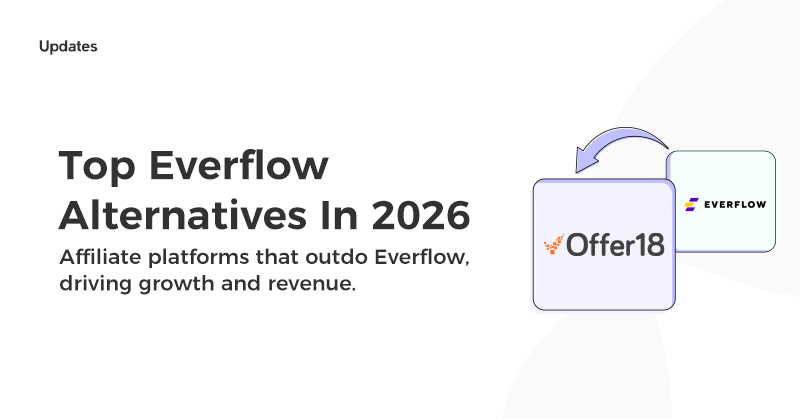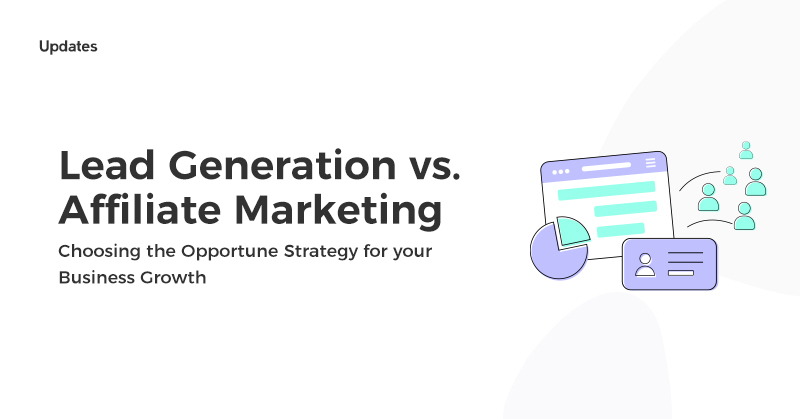
Share
Businesses and individuals constantly seek ways to drive revenue, expand their reach, and increase customer engagement. One of the most effective and widely used strategies is affiliate marketing. If you're new to this concept, you might wonder, "What is affiliate marketing?"This blog post aims to provide a detailed understanding of affiliate marketing, covering its fundamental aspects, how it operates, its benefits and challenges, and tips on getting started.
Simply, to explain affiliate marketing, you need to get to know the affiliate marketing basics better. This article covers the most important information, so you can easily join a program or at least consider affiliate marketing as an option.
What Is Affiliate Marketing?
Affiliate marketing is a performance-based model where businesses (merchants) partner with affiliates to promote their products or services. Affiliates use platforms like websites, blogs, social media, or email to drive traffic or sales. In return, they earn a commission, which can be a percentage of sales, a fixed fee, or payment for leads or clicks, based on the agreement.
How Affiliate Marketing Works
Affiliate marketing is appealing because affiliates are paid based on their results, creating a win-win setup. Merchants gain increased visibility, sales, and reach without upfront costs, while affiliates earn money for their efforts - and everyone has a complete control over it through affiliate marketing solutions. This model motivates affiliates to improve their strategies and target audiences effectively since their earnings depend on conversions.
Merchants can access diverse markets and new customers beyond traditional advertising, while affiliates get a variety of products and services to promote, allowing them to focus on what suits their audience and niche.
The Key Players in Affiliate Marketing
Understanding the primary components of affiliate marketing is important for grasping how the system works and effectively using its potential. By familiarizing yourself with the key players and their roles, you can gain a comprehensive insight into the dynamics of affiliate marketing. This foundational knowledge is quite valuable for those new to the concept and for marketers looking to refine their strategies and maximize their outcomes.
-
Merchants (Advertisers): They are businesses or individuals who want to sell their products or services. They create and offer an affiliate program to attract affiliates who can help promote their offerings.
-
Affiliates (Publishers): Individuals or companies promote the merchant's offerings and earn a commission in exchange. Affiliates utilize multiple marketing channels, including blogs, social media, email marketing, and websites, to reach their audience.
-
Affiliate Networks: These act as intermediaries between merchants and affiliates, providing a platform for them to find each other and manage their partnerships. They handle tracking, reporting, and payment processes, making collaborating easier for both parties.
-
Customers are the individuals who purchase products or services directly through the affiliate's promotional efforts. They play a crucial role as their actions directly impact the affiliate's earnings.
How Affiliate Marketing Works
If you ask yourself what affiliate marketing is, well, it is a whole process that involves a series of steps, each of which plays a vital role in the bubble, from joining an affiliate program to ultimately earning commissions. These steps gather everything from the initial process of selecting and signing up for a suitable affiliate program to the continuous efforts required to promote the products or services, track performance, and optimize strategies for maximum profitability.
-
Affiliate Joins a Program: Affiliates sign up for a merchant's affiliate program, often through an affiliate network. Upon approval, they receive unique tracking links or codes.
-
Promotional Content: Affiliates use these links to promote the merchant's products or services. Promotion can include blog posts, reviews, social media posts, videos, email campaigns, and more.
-
Customer Clicks: When customers click on an affiliate's tracking link, they're redirected to the merchant's website. The affiliate link tracks the customer’s activity.
-
Sale or Action: If the customer completes a desired action (e.g., makes a purchase or fills out a form), the affiliate is credited for the referral. This action is tracked via cookies that store the affiliate's information.
-
Commission: The affiliate receives compensation according to the agreed terms (e.g., a percentage of the sale, a fixed amount per action). Payments are usually made on a set schedule, such as monthly.
Types of Affiliate Commissions
Affiliate programs offer various commission structures, each suited to different marketing strategies. These different models cater to merchants' and affiliates' unique needs and goals. Whether an affiliate aims to drive traffic, generate leads, or make sales, a commission structure rewards their efforts appropriately. Understanding these commission models helps affiliates choose the right programs and helps merchants find the best partners to promote their products or services:
-
Pay-Per-Sale (PPS): Affiliates earn a commission only when their referral results in a sale. This is the most common structure, often involving a percentage of the sale amount.
-
Pay-Per-Click (PPC): Affiliates earn money for each click on their affiliate link, regardless of whether a sale is made. This structure incentivizes affiliates to drive as much traffic as possible.
-
Pay-Per-Lead (PPL): Affiliates earn a commission when their referral leads to a specific action, like subscribing to a newsletter or finishing a contact form, and it is commonly used for services and subscriptions.
Does Affiliate Marketing Really Pay?
Affiliate marketing can be highly rewarding, but success depends on strategy, effort, and niche selection. Affiliates earn commissions by promoting products or services and driving sales, leads, or clicks. Many affiliates generate significant income by targeting the right audience and using effective marketing techniques, such as:
-
SEO - Reaching out to a wider audience through organic results, targeting them with relevant search queries.
-
Social Media - Online engagement through comments, affiliate links, and promotions available only through social channels.
-
Email Campaigns - Launching email campaigns to convert the leads into customers.
How Long Does It Take to Start Making Money with Affiliate Marketing?
The time to make money with affiliate marketing varies. Some may see results in a few months with consistent effort and a strong strategy, while others might take longer. Success depends on factors like your niche, audience, marketing methods, and dedication.
Surely, the product or service quality is an important factor. Make sure you promote only brands and products you trust to ensure consistent income from your affiliate activities.
Benefits of Affiliate Marketing
Affiliate marketing offers many benefits for both merchants and affiliates. It helps merchants increase brand exposure and sales without large upfront costs. Through affiliates, they can reach new audiences and grow their customer base. For affiliates, it offers the chance to earn money and the freedom to promote products or services they like and know well. Affiliate marketing also allows affiliates to make money from their online activities, creating a win-win situation for both sides.
-
Cost-effective: Merchants pay only for actual conversions, not for ad space or impressions, giving a higher return on investment (ROI).
-
Broad Reach: Affiliates can promote products to a wide audience, often reaching niches that the merchant might need help accessing. This expands the merchant’s market reach.
-
Performance-Based: Affiliates are driven to excel as their earnings hinge on the success of their referrals. This aligns with incentives and drives better results.
-
Flexibility: Affiliates can choose products and services that match their interests and expertise, enabling authentic and effective promotions.
-
Passive Income: For affiliates, once the initial promotional content is created, it can generate ongoing income as long as it continues to attract customers.
How to Get Started with Affiliate Marketing
If you're interested in getting into affiliate marketing, there are several important steps to help you get started and set you on the path to success. These initial steps will guide you through establishing your affiliate marketing business, from selecting the right niche and affiliate programs to creating effective promotional content and optimizing your marketing strategies. Here are some steps to help you get started:
-
Choose a Niche: Focus on a niche you know or are interested in. This will help you create fun and engaging content.
-
Research Programs: Find and join reputable affiliate programs that give out products or services relevant to your niche. Look for programs with competitive commissions and good support.
-
Create Quality Content: Develop engaging and informative content that attracts and retains your audience. This could include blog posts, product reviews, tutorials, videos, and social media posts.
-
Promote Effectively: Use various marketing channels to drive traffic to your affiliate links. This contains SEO, social media marketing, email marketing, and paid advertising.
-
Analyze and Optimize: Review your performance metrics regularly and optimize your strategies for better results. You would need to Use analytics tools to track clicks, conversions, and earnings.
-
Build Trust: Nurture trust with your audience by providing honest and valuable recommendations. Transparency about your affiliate relationships is crucial for maintaining credibility.
Tools and Resources for Affiliate Marketers
To succeed in affiliate marketing, using the right tools is important. These tools help you track your progress, manage your content, and reach more people through social media and emails. They also give you insights into what works best so you can improve your strategies and earn more money.
-
Affiliate Tracking Software: Tool like Offer18 helps you to track and optimize your affiliate Marketing campaign performance.
-
Affiliate Networks: Platforms like ShareASale, CJ Affiliate, and Rakuten Marketing provide access to a wide range of affiliate programs and offer tools for tracking and reporting.
-
Content Management Systems (CMS): Platforms like WordPress make creating and managing content easy. They also offer SEO and affiliate link management plugins.
-
SEO Tools: Tools like Google Analytics, SEMrush, and Ahrefs will help you optimize your content for search engines and track your performance.
-
Social Media Management: Tools like as Hootsuite and Buffer can be used to schedule and manage your social media posts, making it easier to promote your affiliate links.
-
Email Marketing: Platforms like Mailchimp and ConvertKit allow you to build and manage email lists, creating another channel for promoting your affiliate offers.
What Is Affiliate Marketing: Final Words
Affiliate marketing is a powerful strategy offering significant benefits for merchants and affiliates. By understanding the basics of "what is affiliate marketing," you can use its potential to drive revenue, expand your reach, and build a successful online business. Affiliate marketing provides a flexible and effective solution, whether you're a business looking to increase sales or an individual seeking passive income. Start with carefully choosing a niche, creating quality content, and promoting products you believe in. With dedication and strategic planning, you can easily succeed in the affiliate marketing department.
FAQs
How much can a beginner make in affiliate marketing?
Beginners can earn anywhere from a few dollars to a few hundred per month, depending on their niche, audience, and effort. With time and experience, earnings can grow significantly.
How many followers do you need to make money from affiliate marketing?
You don’t need a large following to start. Even with a small, engaged audience, you can earn through targeted promotions and effective strategies.
What is the easiest affiliate program to make money?
Offer18 is a beginner-friendly affiliate tracking solution that lets you join various programs, offering a wide range of products and straightforward sign-up processes.



